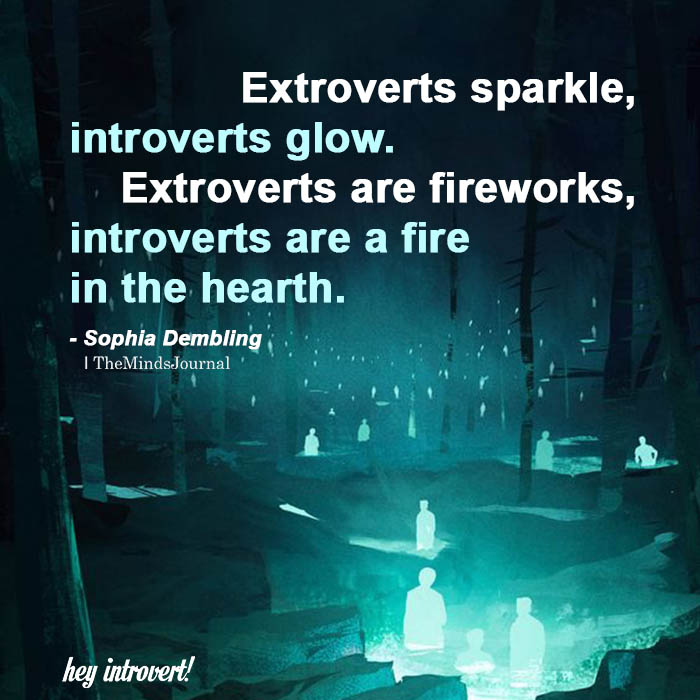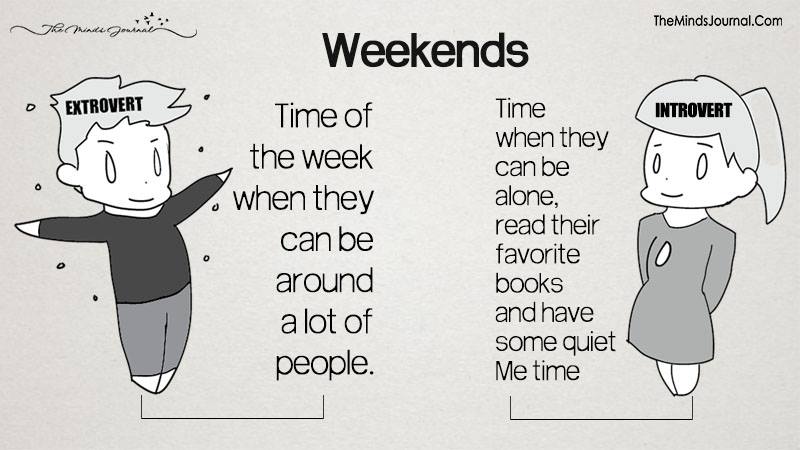Despite their differences, an introvert-extrovert relationship can be one match made in heaven.
The story goes something like this.
A calm-preferring person, who gains their energy from retreating, meets an exuberant energy-rich person who likes to steep themselves in the world, and falls in love. There’s no looking back after that.
Related: What Makes Letting Go Hard for an Introvert
The roller-coasting Adrenalin rush and butterflies in the stomach initially soon give way to frustration that runs the danger of building to a point that it can explode one day.
Welcome to the classic introvert-extrovert relationship. It has a real shot at being successful only if one knows how to negotiate a space that can be called complex.
Both introvert and extrovert were terms coined by the renowned Swiss psychoanalyst Carl Jung in the early 1930s, after which curiosity rose about these personality types and how they process the world around them.
In a study conducted by Cornell University researchers in 2013, it was discovered that the extrovert brain produces more dopamine than the introvert brain.

This means that how the former feels rewarded through the simple acts of eating, loving, having sex etc. is very different from the latter. Is it then any wonder that most extroverts tend to respond in superlatives, while introverts may come across as a lot more inward and withdrawn.
What causes strife in an Introvert-Extrovert relationship?
Various research and establishments have somehow thrown up similar results about the essential behavioral difference between introverts and extroverts.
According to researcher Scott Barry Kaufman, words such as “food”, “sex”, “money” and “social status” are deeply wired into the human genome.
However, the impact that these words have on an introvert and on an extrovert, is very different. The brain of an extrovert fires far more easily at the anticipation of repetitive rewards, in comparison to their introvert counterparts.
When they come in relationship to one another, some major differences such as the following crop up:
1. Disagreements around plans

It’s a known fact that extroverts find value and worth in being connected to the world. Depending upon context and the nature of the person, this connection could be to work, friends, going out often, growing personal and professional network etc.
For an introvert though, rejuvenation comes from spending time alone or with a trusted few.
Related: 5 Things That Makes An Introvert Happy
Thus, in an introvert-extrovert relationship, this difference of wanting to connect and wanting to cut back can often present itself as a big problem.
2. Disagreements around space
Almost as an extension to the previous point, is the kind of disagreements introverts and extroverts tend to have over the topic of “space”.
It’s not uncommon for an introvert to want a room that’s akin to a den, all to themselves. Whether it is to spend time working or taking rest, introverts prefer to be left by themselves.
Extroverts, on the other hand, driven by the connection that they are, like to be around people and are more easily welcoming of intimacy.
This basic difference can wreak havoc in an introvert-extrovert relationship as soon as the initial sheen wears off.
What can you do differently in your Introvert-Extrovert relationship?
Now that you know differences are a given in such a personality equation, the question is, is there something you can do about it?
Turns out the answer is yes and that with a little patience, you can go a long distance as well.
1. Listen and listen well
With processing differences, it is essential for both introverts and extroverts to remember that they see the world very differently. And that essentially, neither is right and neither is wrong.
To remember the difference in processing in the face of resentment, is to be able to cross at least one level of complexity.
Related: Things Extroverts Do That Introverts Will Never Understand
This could, in time, also lessen the expectation that the other person should somehow be like you. A change that could eventually leave each person less stressed and stretched out.
2. Make changes for you
An introvert-extrovert relationship can pressurize both the people involved to change the other . In a way, it is human to do so, simply because changing oneself or even the thought of it, is bound to be followed by resistance.
However, it is anybody’s guess that such attempts can derail the relationship more than anything else. That is not to say you can’t make changes and compromises.
Though it does mean, that if you’re doing them, do it for yourself. Most relationships, and more so introvert-extrovert relationships, suffer most when you make changes keeping the other person at the centre.
One way to do this is to keep checking with yourself why you are doing what you are doing.
3. Work on having fun together
If you’re in an introvert-extrovert relationship, fun can take work at the beginning.
Take this fact a little too personally and it can leave you feeling angry and resentful. But if you learn to take it in your stride, compromises may begin to seem more palatable.
Related: 10 Things You Didn’t Know About Extroverted Introverts
Since there are inherent differences in this combination, it is likely that you’ll have to bargain between independence and interdependence all the way through.
List out things you can do with each other. That will also give you a list of things that you’ll have to keep separate, allowing each of you to then explore how to use your “independent” time.
4. Make frequent clarifications
Whether you’re an introvert or an extrovert, it’s highly likely that your idea is not to hurt your partner by being who you are or the way you process the world around you. Put simply, it is what it is.
However, a basic set of differences can often make an introvert and extrovert question and doubt each other.
Related: 11 Reasons Why Introverts Are Terrible At Dating
To avoid this, set your intentions clear and seek and make clarifications more often than you’d probably like.
Articulating your truth precisely and with emotions as you experience them, can be helpful.
5. Balance your preferences
Once you’ve accepted that you’ll have to work against the tide in some ways in an introvert-extrovert relationship, set about to strike a balance about plans and preferences.
Follow the given one, take one approach.
Explore if you can make space for this approach more and more, though let’s agree that, to begin with, such a balancing act might seem fake or highly pretentious.
6. Any polarization in the relationship can affect the people involved.
An introvert-extrovert combination is unique. What can help is to remember that no one really is a “pure” introvert or extrovert, because, in truth, even introverts need company and extroverts need to rejuvenate by retreating.
Given how complex it can get, taking some of the above-mentioned steps can clear your path, a little bit every single time.




Leave a Reply